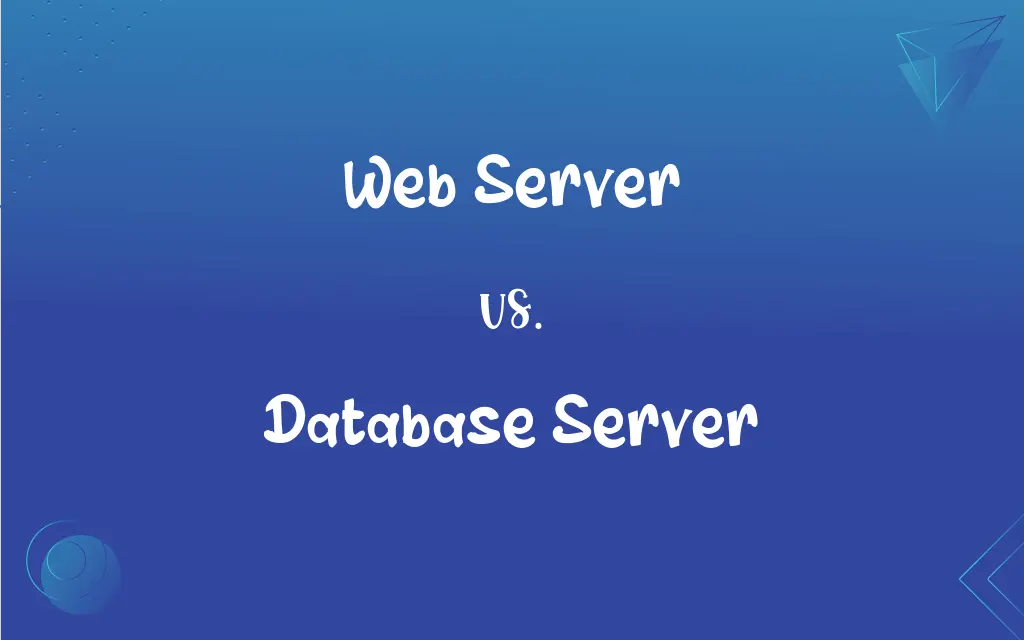Web Server vs. Database Server: What's the Difference?
Edited by Aimie Carlson || By Harlon Moss || Updated on October 7, 2023
A web server handles HTTP requests and sends static content to users’ browsers, while a database server stores, retrieves, and manages data in databases.

Key Differences
A web server primarily deals with processing and delivering web pages to users. Database servers, in stark contrast, handle database queries and manage database storage, ensuring that data is securely stored and efficiently retrievable.
The core function of a web server is to serve static or dynamic web content, while a database server specializes in providing a robust environment for managing and interacting with data storage.
On one hand, web servers need to be optimized for serving content quickly and handling concurrent user requests effectively. Conversely, database servers must be structured to handle complex queries and safeguard the integrity and consistency of the data they store.
Web servers, usually interacting with one or more database servers, render and deliver fetched data to the end-users in a human-readable format. Database servers, on the other hand, may engage with various web servers to provide requested data from multiple web applications.
Comparison Chart
Primary Function
Serves web pages to users
Manages and provides data
ADVERTISEMENT
Main Concern
Rendering and serving content
Data storage and retrieval
Typical Interactions
Directly with browsers
With web servers or apps
Example Software
Apache, Nginx
MySQL, PostgreSQL
Core Optimization
Handling HTTP requests efficiently
Executing data queries swiftly
Web Server and Database Server Definitions
Web Server
A web server can communicate with a database server to fetch data for dynamic content.
The web server queried the database server for user login information.
ADVERTISEMENT
Database Server
A database server may also refer to the physical server on which the database application runs.
The IT team is upgrading the hardware of our main database server.
Web Server
A web server handles HTTP requests and sends data to be displayed on the web browser.
When a user clicked the link, the web server processed the request swiftly.
Database Server
Database servers are often optimized for handling complex queries and ensuring data consistency and integrity.
The database server performed a rollback to maintain data integrity after an error.
Web Server
A web server is software that serves web pages upon request.
The web server delivered the requested page in milliseconds.
Database Server
Database servers interact with web servers to provide them with the necessary data for content rendering.
Upon request, the database server sent user data to the web server.
Web Server
Web servers can deliver static content or generate dynamic content based on user inputs.
The web server dynamically generated a user’s profile page.
Database Server
A database server is a server which houses a database application that provides database services and responses to database queries.
The database server processed the complex query in a fraction of a second.
Web Server
A web server can also refer to the physical hardware that runs web server software.
Our web server experienced downtime due to a hardware malfunction.
Database Server
A database server stores, retrieves, and manages data in a structured format.
The database server securely stored the user’s sensitive information.
FAQs
Can a machine host both a web server and a database server?
Yes, a single machine can host both, but for scalability and optimization, they're often separated in larger applications.
What is a web server?
A web server is software or hardware that uses HTTP/HTTPS to process and deliver web pages to users' browsers.
What is a database server?
A database server is a system (software and suitable hardware) that provides database services and responds to database queries.
Can a database server work independently?
Yes, a database server can operate independently for tasks like data analysis, storage, and management.
What is the difference between frontend and backend in web development?
The frontend refers to client-side, user-facing elements while the backend, often involving a web server and database server, manages data processing and storage.
How is data security managed in database servers?
Data security in database servers is managed through access controls, encryption, backups, and compliance with data protection regulations.
What is a static web page?
A static web page is fixed content delivered by a web server, displayed as-is to every user without dynamic data retrieval.
Are web servers and database servers platform-dependent?
While some servers may have platform preferences or optimizations, many web and database servers support multiple operating systems.
How do database servers back up data?
Database servers use various strategies like full, incremental, and differential backups to safeguard data.
What are examples of database server software?
Examples include MySQL, PostgreSQL, and Microsoft SQL Server.
Is a web server necessary for a website?
Yes, a web server is fundamental to host a website and make it accessible to users.
Can a web server serve multiple websites?
Yes, a web server can host multiple websites simultaneously using a technique called virtual hosting.
How does a database server handle concurrent data access?
Database servers employ locking, concurrency control, and transactions to manage simultaneous data access.
Can database servers handle large volumes of data?
Yes, modern database servers are designed to manage and query large datasets efficiently and reliably.
How do web servers and database servers communicate?
Typically, they communicate over a network using protocols and interfaces like JDBC or ODBC.
What are examples of web server software?
Examples include Apache HTTP Server, Nginx, and Microsoft IIS.
How does a database server ensure data integrity?
Database servers use ACID properties (Atomicity, Consistency, Isolation, Durability) to ensure data integrity during transactions.
Why do web servers interact with database servers?
Web servers interact with database servers to fetch, store, and manage data needed to serve dynamic web content.
What is the role of HTTP in a web server?
HTTP is the protocol used by web servers to transmit data and manage communication with web browsers.
What is load balancing in web servers?
Load balancing distributes incoming web traffic across multiple servers to ensure no single server is overwhelmed.
About Author
Written by
Harlon MossHarlon is a seasoned quality moderator and accomplished content writer for Difference Wiki. An alumnus of the prestigious University of California, he earned his degree in Computer Science. Leveraging his academic background, Harlon brings a meticulous and informed perspective to his work, ensuring content accuracy and excellence.
Edited by
Aimie CarlsonAimie Carlson, holding a master's degree in English literature, is a fervent English language enthusiast. She lends her writing talents to Difference Wiki, a prominent website that specializes in comparisons, offering readers insightful analyses that both captivate and inform.































































